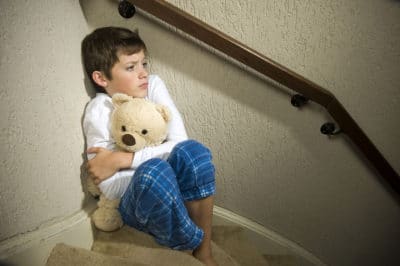 Have you heard about this study yet? Seems even preschoolers get depressed these days.
Have you heard about this study yet? Seems even preschoolers get depressed these days.
Our national mythology tells us childhood is a happy time, but that’s just so not for a lot of kids. (Take these boys, for instance.) Is it possible that some of these kids need medical intervention?
According to study author, Joan L. Luby, MD from the Washington University School of Medicine, “this research… demonstrates that preschool depression is not clinically insignificant and does not spontaneously resolve.”
That does not necessarily mean that all depressed kids need to be treated with anti-depressants. I recently talked to a number of experts about boys and ADHD, and to a person, each and every one said that meds should be a last resort, used after or in conjunction with behavioral and environmental interventions. I’m guessing that the same will hold true for preschoolers and depression. (Another just-published study found that teaching resilience can temper depression and improve grades.)
What it does mean is that we need to watch our kids for signs of depression, symptoms that go beyond normal episodic sadness. Possible symptoms include:
- Intense &/or sudden loss of interest in play
- Changes in sleep patterns
- Sustained decreased joyfulness
- Intense shame and guilt
- Decreased energy
- Changes in school work
- Changes in socialization
- Healthy child complaining of illness
- Change in appetite
- Over-reacting to criticism
Keep in mind that boys may have different symptoms than girls. In a study of teens, boys were more likely to exhibit loss of pleasure, depressed morning mood and morning fatigue. (Hmm…note to self: Watch Boy #2). Among second grade boys, behavior and attention problems are linked to depression.
The good news here is that researchers seem to believe that if depression is caught and treated early, it may be possible to weaken depression’s grip. Dr. Luby again: “Applying an intervention at a time when the brain is more changeable or neuroplastic — just like introducing speech therapy as early as possible for children with speech problems — [leads to] the hope or possibility that treatment might be more effective and actually change the trajectory of the disorder.”
Very good news indeed.
What do you think? Is it possible for preschoolers to be depressed? Is treatment ever warranted? Or are we simply medicalizing childhood?







3 Responses
I don’t know. I can see both sides. The resiliancy studies were very interesting. I am interested in how I might be able to incorporate some of these ideas into parenting my children. I do believe that you can be brought up to have a more positive outlook, but I’d like some concrete techniques to make that happen. Let us know if you run across any Parental How-To tips.
I have the same questions, Deb. A couple of boys do not have naturally upbeat personalities (neither do I, for that matter), and I think it would be helpful to all of to incorporate some resilancy training. I’ll be looking this up and will be sure to post my findings.
I’d like to see you write a post about ways parents can teach this resilience. For instance, I used to have my son draw out his feelings when he was too young to be able to or couldn’t quite articulate in words what he was feeling. I knew he loved to draw. So I encouraged him to use that skill/interest to help himself recover from an upset. It generally worked very well. Other kids might be able to act it out, journal about it, ride a bike through it, etc. I think your readers would find such a post as useful as this information. What do you think?